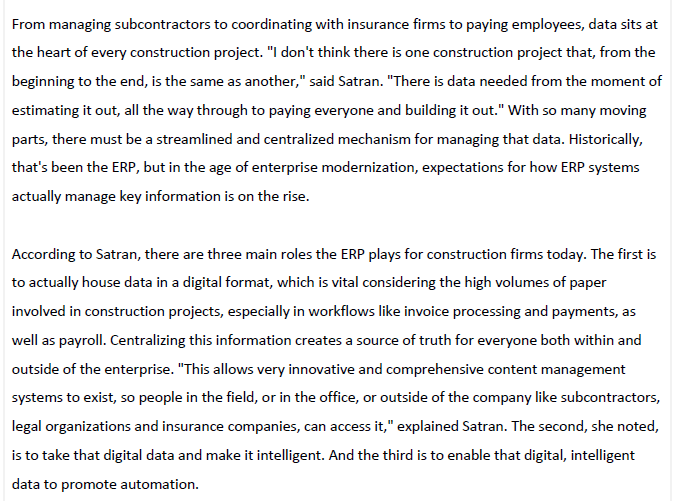From managing subcontractors to coordinating with insurance firms to paying employees, data sits at the heart of every construction project. "I don't think there is one construction project that, from the beginning to the end, is the same as another," said Satran. "There is data needed from the moment of estimating it out, all the way through to paying everyone and building it out." With so many moving parts, there must be a streamlined and centralized mechanism for managing that data. Historically, that's been the ERP, but in the age of enterprise modernization, expectations for how ERP systems actually manage key information is on the rise. According to Satran, there are three main roles the ERP plays for construction firms today. The first is to actually house data in a digital format, which is vital considering the high volumes of paper involved in construction projects, especially in workflows like invoice processing and payments, as well as payroll. Centralizing this information creates a source of truth for everyone both within and outside of the enterprise. "This allows very innovative and comprehensive content management systems to exist, so people in the field, or in the office, or outside of the company like subcontractors, legal organizations and insurance companies, can access it," explained Satran. The second, she noted, is to take that digital data and make it intelligent. And the third is to enable that digital, intelligent data to promote automation.
From managing subcontractors to coordinating with insurance firms to paying employees, data sits at the heart of every construction project. "I don't think there is one construction project that, from the beginning to the end, is the same as another," said Satran. "There is data needed from the moment of estimating it out, all the way through to paying everyone and building it out." With so many moving parts, there must be a streamlined and centralized mechanism for managing that data. Historically, that's been the ERP, but in the age of enterprise modernization, expectations for how ERP systems actually manage key information is on the rise. According to Satran, there are three main roles the ERP plays for construction firms today. The first is to actually house data in a digital format, which is vital considering the high volumes of paper involved in construction projects, especially in workflows like invoice processing and payments, as well as payroll. Centralizing this information creates a source of truth for everyone both within and outside of the enterprise. "This allows very innovative and comprehensive content management systems to exist, so people in the field, or in the office, or outside of the company like subcontractors, legal organizations and insurance companies, can access it," explained Satran. The second, she noted, is to take that digital data and make it intelligent. And the third is to enable that digital, intelligent data to promote automation.
Fundamentals of Information Systems
9th Edition
ISBN:9781337097536
Author:Ralph Stair, George Reynolds
Publisher:Ralph Stair, George Reynolds
Chapter1: An Introduction To Information Systems In Organizations
Section: Chapter Questions
Problem 11SAT
Related questions
Question
Recommend ERP systems for the construction industry.

Transcribed Image Text:From managing subcontractors to coordinating with insurance firms to paying employees, data sits at
the heart of every construction project. "I don't think there is one construction project that, from the
beginning to the end, is the same as another," said Satran. "There is data needed from the moment of
estimating it out, all the way through to paying everyone and building it out." With so many moving
parts, there must be a streamlined and centralized mechanism for managing that data. Historically,
that's been the ERP, but in the age of enterprise modernization, expectations for how ERP systems
actually manage key information is on the rise.
According to Satran, there are three main roles the ERP plays for construction firms today. The first is
to actually house data in a digital format, which is vital considering the high volumes of paper
involved in construction projects, especially in workflows like invoice processing and payments, as
well as payroll. Centralizing this information creates a source of truth for everyone both within and
outside of the enterprise. "This allows very innovative and comprehensive content management
systems to exist, so people in the field, or in the office, or outside of the company like subcontractors,
legal organizations and insurance companies, can access it," explained Satran. The second, she noted,
is to take that digital data and make it intelligent. And the third is to enable that digital, intelligent
data to promote automation.
Expert Solution
This question has been solved!
Explore an expertly crafted, step-by-step solution for a thorough understanding of key concepts.
Step by step
Solved in 3 steps

Knowledge Booster
Learn more about
Need a deep-dive on the concept behind this application? Look no further. Learn more about this topic, computer-science and related others by exploring similar questions and additional content below.Recommended textbooks for you

Fundamentals of Information Systems
Computer Science
ISBN:
9781337097536
Author:
Ralph Stair, George Reynolds
Publisher:
Cengage Learning

Management Of Information Security
Computer Science
ISBN:
9781337405713
Author:
WHITMAN, Michael.
Publisher:
Cengage Learning,

Information Technology Project Management
Computer Science
ISBN:
9781337101356
Author:
Kathy Schwalbe
Publisher:
Cengage Learning

Fundamentals of Information Systems
Computer Science
ISBN:
9781337097536
Author:
Ralph Stair, George Reynolds
Publisher:
Cengage Learning

Management Of Information Security
Computer Science
ISBN:
9781337405713
Author:
WHITMAN, Michael.
Publisher:
Cengage Learning,

Information Technology Project Management
Computer Science
ISBN:
9781337101356
Author:
Kathy Schwalbe
Publisher:
Cengage Learning

Principles of Information Systems (MindTap Course…
Computer Science
ISBN:
9781305971776
Author:
Ralph Stair, George Reynolds
Publisher:
Cengage Learning